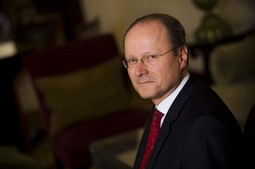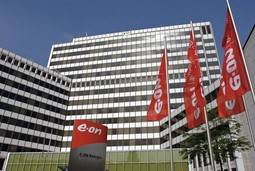Published in Nacional number 768, 2010-08-03
GAS WAR UNDERWAY
We are offering Croatia a secure supply of natural gas
IN THIS EXCLUSIVE INTERVIEW Stefan Vogg, a board member at German energy giant E.ON, confirmed the company's interest in selling gas on the Croatian market
 VOGG WAS IN ZAGREB LAST WEEK to meet with Croatian economy minister Duro Popijac, and says that the delivery of natural gas could start in the very near futureA natural gas pipeline between the small Croatian town of Slobodnica and the Hungarian town of Varosfold should go operational by the end of the year, which would give Croatia its first new supply source for natural gas in the last 30 years. This would give Croatia the possibility of buying natural gas from several suppliers and greatly reduce its long time dependency on the Russian state owned company Gazprom. It is precisely for this reason that a growing number of European energy companies are showing an interest in supplying Croatia with natural gas, with the most concrete proposals to date coming from the German company E.ON Ruhrgas, the natural gas division of German energy giant E.ON.
VOGG WAS IN ZAGREB LAST WEEK to meet with Croatian economy minister Duro Popijac, and says that the delivery of natural gas could start in the very near futureA natural gas pipeline between the small Croatian town of Slobodnica and the Hungarian town of Varosfold should go operational by the end of the year, which would give Croatia its first new supply source for natural gas in the last 30 years. This would give Croatia the possibility of buying natural gas from several suppliers and greatly reduce its long time dependency on the Russian state owned company Gazprom. It is precisely for this reason that a growing number of European energy companies are showing an interest in supplying Croatia with natural gas, with the most concrete proposals to date coming from the German company E.ON Ruhrgas, the natural gas division of German energy giant E.ON.
This is in fact why Croatia was visited last week by a member of the company's management board, Stefan Vogg, who met in Zagreb with Croatian Economy Minister Duro Popijac. The 48-year-old lawyer spoke with Popijac about the possibility of E.ON Ruhrgas taking a major stake in the supply of the Croatian natural gas market, and other projects the company could undertake in Croatia, prominent among which are a terminal for liquefied natural gas that is to be built on the island of Krk by the Adria LNG consortium, in which the German company is one of the partners.
In this exclusive interview for Nacional Vogg confirmed the firm interest of E.ON Ruhrgas to sell its natural gas in Croatia, and regardless of whether his proposal is accepted, it marks the start of a large-scale market battle that will on the long term inevitably result in lower prices and greater security in the supply of natural gas to the Croatian market.
NACIONAL: What are the chief interests of E.ON Ruhrgas in Croatia?
- The construction of the natural gas pipeline connection between Croatia and Hungary has launched the process of the liberalisation of the natural gas market in Croatia. We at E.ON Ruhrgas see a good opportunity for business collaboration in this. We want to offer the supply of significant quantities of natural gas to Croatia. The delivery could start very soon, even though the talks with the Croatian Government and Croatian companies are still ongoing. We have at our disposal several sources of supply and a broad and flexible portfolio. E.ON Ruhrgas is also participating in the Adria LNG consortium, which plans to build a liquefied natural gas (LNG) terminal on the island of Krk. This is a project that could improve the security of supply in the region. Given the current situation, however, and the planned commercial activities on the project, a final decision on this investment will only be made in 2013.
NACIONAL: Can E.ON Ruhrgas offer Croatia better terms for the supply of natural gas than Russian Gazprom, which has to date been practically the sole supplier of natural gas to Croatia?
- I think it would not be in good form to comment the operations of other companies, but in principle and with certainty I can say that Croatia can benefit from this competition. We are currently operating in fourteen European countries and feel that Croatia will be in an excellent position with the construction of a new natural gas pipeline. Croatia will have the option of supplying itself with natural gas from Austria and Hungary, where our company has significant wholesale portfolios. We are aware that Croatia lacks sufficient natural gas storage capacity, which can be a problem in the winter, because consumption peaks then and large quantities have to be released to the system from storage reserves over a short period of time. We have enormous natural gas storage facilities in Hungary and using them could resolve the problem for Croatia.
NACIONAL: Will you offer Croatia long-term supply contracts or the option of buying natural gas on the basis of short-term spot contracts?
 THE HEADQUARTERS OF THE E.ON COMPANY is in Dusseldorf, it has about 90 thousand employees and its earnings in 2009 were about 8.5 billion euro- We can offer both, depending on which option Croatian partners decide on. We can offer Croatia long-term contracts linked to the price of oil, and the option of short-term purchases of smaller quantities of natural gas. Croatia has to date practically not been in a position to buy natural gas on spot markets, because it was limited by the capacities of natural gas supply pipelines. In that situation it made sense to concentrate on long-term supply contracts, which offer a greater degree of security. But thanks to the new pipeline Croatia can organise a much more flexible supply of natural gas, balanced between long-term and short-term contracts, and thereby gain significant savings.
THE HEADQUARTERS OF THE E.ON COMPANY is in Dusseldorf, it has about 90 thousand employees and its earnings in 2009 were about 8.5 billion euro- We can offer both, depending on which option Croatian partners decide on. We can offer Croatia long-term contracts linked to the price of oil, and the option of short-term purchases of smaller quantities of natural gas. Croatia has to date practically not been in a position to buy natural gas on spot markets, because it was limited by the capacities of natural gas supply pipelines. In that situation it made sense to concentrate on long-term supply contracts, which offer a greater degree of security. But thanks to the new pipeline Croatia can organise a much more flexible supply of natural gas, balanced between long-term and short-term contracts, and thereby gain significant savings.
NACIONAL: In Croatia there has been a lengthy debate on the justification of the current tariff system, based on which the price of natural gas for households is regulated by the state, and is kept at a very low level. What is in your opinion the optimum method of setting the price of natural gas?
- Every country determines the tariff system based on its needs and preferences, and it is not incumbent upon me to evaluate their appropriateness. Our experience to date, however, shows that encouraging competition in every segment of the natural gas market is the best approach. It is, therefore, vital to have several sources of supply, and multiple importers and distributors of natural gas. Market competition is the best way to determine a fair price, acceptable to consumers and sufficient to natural gas companies to finance natural gas infrastructure.
NACIONAL: E.ON Ruhrgas is part of the consortium that would build an LNG terminal on the island of Krk. What is the current status of the project?
- Liquefied natural gas is key to European diversification in the supply of gas, and the construction of a terminal like the one planned on the island of Krk would give a small country like Croatia access to the global LNG market, which is highly competitive. In this regard there is no doubt that the project on the island of Krk could improve the security of supply in the region. But the implementation of this project, like many others in Europe, depends above all on the macroeconomic situation in Europe. It is exceedingly important that the project enjoys the firm support of Croatian Government and the Croatian companies who wish to invest. In the current situation the project would be bolstered if new companies were to join the consortium.
NACIONAL: Where does E.ON Ruhrgas get its gas?
- We are convinced that the diversification of the procurement of natural gas is key to the security of supply. That is precisely why we now procure natural gas in almost equal ratios from Norway, Russia, The Netherlands, and from German production. We also co-finance the production of gas and develop projects for the supply of gas from LNG. Thanks to our developed system of procurement and our technical infrastructure, we succeeded on short notice in supplying Croatia and other Central European countries with emergency quantities of natural gas during the most recent interruption in the supply of gas. During the gas dispute E.ON delivered about a million cubic metres of gas a day to Croatia.
NACIONAL: How did the economic crisis and the significant drop in the consumption of gas caused by the crisis affect your operations?
- There is no doubt that the crisis caused certain negative effects to our operations, but it would be a mistake to evaluate the situation in the context of the last two years. There is no doubt that the consumption of gas in Europe will recover in the near future. I have already noted that we have operations in fourteen European countries and in some, like Germany, we have now had several months of rising industrial production, while others are seeing a slower rate of recovery. E.ON. Ruhrgas has long term contracts on the supply of gas that expire in 2036.
NACIONAL: The production of gas from non-conventional sources has seen strong growth around the world these past years, such as gas produced from schist. How has this trend affected the market?
- The development of non-conventional finds of gas has had a significant effect on the global gas market over the past few years. The United States has achieved major progress in the development of gas production from schist, which is taking a growing share of domestic gas production. This has resulted in a drop in the demand for liquefied gas in the USA and that, along with the general drop in global consumption caused by the recession, has resulted in a surplus of gas on the market. In Europe the situation is different because this area is not well explored.
Latest news
-
28.10.2010. / 14:15
'A profitable INA is in everyone's interest'
-
28.10.2010. / 09:38
Sanader’s eight fear SDP — Won’t bring down Government
-
21.10.2010. / 15:02
Interior Ministry turned a blind eye on Pukanic assassination
-
20.10.2010. / 09:34
Barisic could bankrupt HDZ



